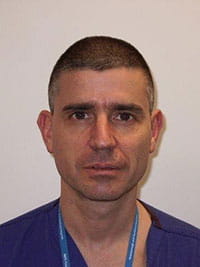Surgical First Assistant case study
You can find out more about a Surgical First Assistant's perspective here. We spoke to Mark Robertshaw, a Surgical First Assistant, about how the surgical care team works in his Trust.
A brief summary of local surgical care team roles
In my speciality of Orthopaedics, we have Surgical Care Practitioners (SCPs) and Surgical First Assistants (SFAs). SCPs are dedicated to a particular surgeon and sometimes attend operations in theatre. I have two SFAs qualified in my team but they are rarely used in this capacity due to the chronic staff shortage we have with Scrub Practitioners.
How have surgical care team roles supported patient care, the service, and the team?
Quite simply if surgical care team roles were not available, appointments would be cancelled due to lack of assistance at the table. The support to all stakeholders is obvious and extant.
What do you enjoy most about being part of the surgical care team?
My enjoyment is the challenge of increasing my professional expertise for the benefit of my patient and the trust. I enjoy making a difference at the table, the relationship with my surgical staff and the role modelling for the junior scrub staff. I am rightly proud of my achievements.
What challenges do surgical care teams face?
I feel constrained by the dogma of the role. Surgical First Assistants have clear boundaries in practice but with training could be so much more useful and even better value for money. I feel the inequality acutely between those SFAs who trained before me who are allowed a more intervention based experience, e.g. closure of the wound. I am often the only assistant for the consultant and am constantly asked, “Why can you not close for me?" My place is in theatre, whilst my Surgical Care Practitioner colleagues have a different calling. The challenge lies in developing and evolving the role further to its maximum efficacy.
